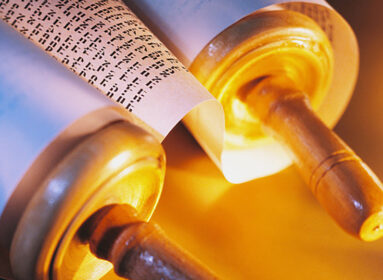
By Shlomo Riskin
“And the Lord spoke to Moses saying, ‘Speak to Aaron and to his sons saying so shall you bless the children of Israel; say to them, may the Lord bless you and keep you…’” (Numbers 6:22-27)
There are very few passages of the Bible that are as well known as the “Priestly Benediction.”
In Israel the kohanim – priests rise to bless the congregation every single morning. In the Diaspora, Ashkenazi Jews include this special benediction only on the Festivals. Nevertheless there are many life-cycle celebrations, such as circumcisions, redemptions of the first- born, bar/bat mitzvoth and even weddings which are punctuated by this Priestly
Blessing. In effect, the kohen-priest stands as God’s representative, as the “agent of the Compassionate One,” as spiritual leader and as Torah teacher – and in this function as teacher and guide — he calls upon God to bless the congregation. As Moses declares in his final blessing to the Israelites, “(The Priests and Levites) shall guard Your covenant, shall teach Your laws to Jacob and Your Torah to Israel…” (Deut. 33:9,10)
The Talmud (in the 9th chapter of Berachot) as well as our prayer liturgy declare “At the time of the priestly blessings, the congregation responds, ‘Master of the Universe I am Yours and my dreams are Yours.’ Apparently, our sages saw a profound connection between the dreams of the congregation of Israel and the function of their priest leaders. Exactly what is the nature of that connection?
First and foremost a leader and an educator must inspire his students – congregants – nation, with a lofty vision, with an exalted dream. The psalmist and sweet singer of Israel, King David declares in the Psalm, which we recite each Sabbath and Festival before the reciting the Grace after Meals, “When the Lord returned with the restoration of Zion we were as dreamers”; after all, had the Jews not dreamt of the return to Israel throughout their long exiles, we never would have returned to our homeland.
One sees the same idea from the opposite vantage point when one realizes the cause of the great tragedy of the Book of Numbers. In Numbers, the Jewish people descend from the great heights of the Revelation at Sinai to the disastrous depths of the sin of the scouts, the rebellion of Korah, the sin of Moses and the destruction of that entire generation in the desert. What caused such a mighty fall? The Bible itself begins its account of the descent with the words, “And it happened that the nation kvetched (mitonenim) evily.” (Numbers 11:1) The 18th century Netziv explains the difficult Hebrew word mitonenim as meaning “wandering hither and thither” aimlessly and without purpose or direction, from the Hebrew anna. Simply put, this great Torah leader was saying that the Israelites had lost the dream and the vision which they felt at Sinai when they had cried out “We shall do and we shall internalize,” when they accepted upon themselves the Divine mission of being a “Kingdom of Priests and a holy nation.” They descended into destruction because they lost the dream.
Secondly, the Hebrew word for dream is halom. With a simple switch of letters, it spells hamal which means love and compassion. The priest leader who inspires with his dream must first and foremost love his nation; only if he loves the Israelites will they believe themselves worthy of being loved, will they believe in their ability to realize the dream and achieve the vision. Great leaders such as Franklin Delano Roosevelt, Winston Churchill and David Ben Gurion lifted their respective nations to unheard of heights because they helped make them believe in themselves.
Thirdly, halom, with another switch of letters, spells lohem, which means fighting, warring (if need be) to achieve the necessary goals. A great measure of imparting a dream is to impart idealistic sacrifice on behalf of that dream.
Fourthly, halom, also spells lehem; a dream must be nourished with the material necessities of program, tactics and strategy necessary to accomplish the dream.
Fifthly, halom also spells melah or salt. Salt symbolizes tears – the tears of sacrifice and commitment – as well as eternity, since salt never putrefies. Salt is therefore the symbol of our Covenant with God, the Covenant that guarantees Jewish eternity and ultimate redemption.
And finally, halom is linguistically tied to halon, a window, a light to the outside world. The dream with which the priest/kohen must inspire the Israelites is a dream which encompasses the entire world; the dream of “Through you shall be blessed all the families of the earth”; the dream of “ They shall beat their swords into ploughshares and their spears into pruning hooks.”
Those who believe in a God who is invisible may well dare to dream the dream which is impossible but only those who dream the impossible will ever achieve the incredible.
Rabbi Shlomo Riskin is chancellor of Ohr Torah Stone and chief rabbi of Efrat, Israel.








 Southern New England Jewish Ledger
Southern New England Jewish Ledger










